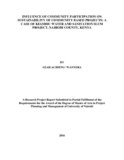| dc.description.abstract | This study sought to investigate the influence of community participation on sustainability of community based projects. Kiambiu Water and Sanitation (KIWESA) Slum Project in Nairobi County, Kenya was chosen for the study. Relevant literature was reviewed on the topics of project sustainability and community participation, particularly community participation in need analysis, project planning, project implementation and project monitoring & evaluation, and how they influence sustainability of community based projects. The study employed descriptive survey research design. A population of 2,404 respondents constituting of 2,400 Kiambiu slum households and 4 programme officers from Maji na Ufanisi, the main NGO sponsoring KIWESA slum project was targeted for the study. A sample of 335 respondents was selected from the target population. The sample constituted 331 Kiambiu slum households and the 4 programme officers from Maji na Ufanisi. The 331 Kiambiu slum households were selected using systematic random sampling technique while the entire population of programme officers from Maji na Ufanisi was included in the study. Questionnaires were used to collect quantitative and qualitative data from the respondents. Reliability of the questionnaires were tested using the split-half method; a high reliability coefficient of 0.99 was obtained. Quantitative data collected was analyzed using Statistical Package for Social Sciences (SPSS) V21 while qualitative data was analyzed using content analysis. Results of the study were interpreted using descriptive statistics: frequency distribution, mean, standard deviation and percentages as well as inferential statistics: regression model and Pearson product-moment correlation coefficient. The regression model was used to predict how the independent variables that is, community participation in need analysis, project planning, project implementation and project monitoring and evaluation influence the dependent variable, sustainability of community based projects. Regression analysis established that there is a significant relationship between community participation and project sustainability: when community participation is zero, sustainability of community based projects is negatively influenced with a magnitude of -0.035. The various aspects of community participation influence sustainability of community based projects with different magnitudes. Community participation in need analysis has the greatest influence at 0.399, followed by community participation in project implementation at 0.390 and then by community participation in monitoring and evaluation at 0.201. Community participation in project planning has the least influence on sustainability of community based projects with a magnitude of 0.033. Correlation analysis established that there exists a strong positive correlation between the various aspects of community participation and sustainability of community based projects as shown by correlation coefficients all of which were above 0.5. The study concluded that community participation in community based projects has a significant influence on sustainability of the projects; sustainability is negatively influenced when community participation is zero and improves with greater community participation. Additionally, the strong positive correlation between community participation and sustainability indicates that an increase or decrease in sustainability significantly relates to an increase or decrease in community participation. The study recommends that: Development interventions targeting a community ought to ensure that the community participates in need analysis if the interventions are to be sustained; The community be trained on technical aspects of project planning to build their capacity, thereby improving project sustainability; Local resources, skills and knowledge should be used to implement local projects to keep the project relevant to the community and improve sustainability; The community should be involved in earlier stages of the project cycle leading up to monitoring and evaluation, otherwise their participation in monitoring and evaluation will have less meaning. | en_US |

